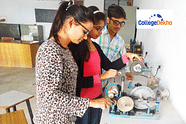UPSC CMS vs NEET PG becomes a tough choice after MBBS. So, let’s have a look at some factors that will help you decide whether to choose UPSC CMS or NEET PG after MBBS.

UPSC CMS vs NEET PG - Which is the Best Option after MBBS
? Choosing the right path after completing MBBS is a critical decision that affects the professional journey of a medical student. There are many options, but two of the most prominent options stand out, and they are UPSC Combined Medical Services (CMS) and the National Eligibility cum Entrance Test Postgraduate (NEET PG). Both pathways offer unique opportunities and challenges, catering to distinct aspirations within the medical field. The
NEET PG 2025
Exam will be conducted on June 15th, 2025, and the UPSC CMS 2025 exam date is July 20th, 2025.
In this article, we will delve into the comparative analysis of UPSC CMS vs NEET PG, exploring the intricacies of each examination, the career prospects they unlock, and the factors to consider when deciding which course to pursue after earning a degree in medicine.
NEET PG vs UPSC CMS After MBBS- What's the Difference?
Now that you are aware of the major factors that you should consider while deciding between UPSC CSM vs NEET PG , here’s a list of pros and cons that you must check.
Factors | UPSC CMS | NEET PG |
|---|---|---|
Detailed Description | ||
Investment in Time | An opportunity to directly work after completing an MBBS degree. No more degrees required | 3 more years of studying are required to grab a job opportunity |
Prestige and Name | Would only have an MBBS degree to your name | |
Salary | Fixed and stable salary | Depending on the work, no limit to the highest salary, but lacks stability |
Side Hustle | No private practice would be allowed along with a govt. job | Can become an associate professor in an organisation, as well as do private practice. |
Fame | Being limited to the government-assigned clinic or hospital, low to no scope of fame | Not being limited to a particular organisation or location, a higher opportunity to fame |
Security | Job, future and financial security guaranteed, minus the pressure of the uncertainty of your future after a degree | No immediate job security, plus the pressure of job hunt after a degree as medical colleges rarely provide placements |
Job Location | No control over which city you work in. Could be a rural area as well | Rural or urban area, work anywhere you want |
Work Load | Fixed work timings, minimum workload | The hectic life, heavy workload during the degree, as well as after completing it |
Job Satisfaction | Low chances of work satisfaction | High chances of work satisfaction as you are free to work in the specific field or branch you are interested in |
Hustle/ Hardwork | Provides early settlement through a permanent job without investing a lot of time, money and work | With no campus placement after the course, you have to first establish yourself and work harder to settle down |
Level of Examination Difficulty | Despite the same syllabus, UPSC CMS is comparatively easier as only the syllabus of MBBS pre-final and final year is included | The syllabus is comparatively tougher and includes subjects from the first, second, pre-final, and final year of MBBS |
Specialisation | Just MBBS, not as skilled, basic knowledge of everything, but not deep | Helps gain in-depth knowledge of a field and causes you to be more skilled |
Field Competition | Comparatively less competitive (Every year, around 40K candidates are applying for 800+ vacancies. Out of all the applicants, only around 20K appear in the exam.) | Comparatively more competitive (Every year, 1.04 - 1.9L MBBS graduates, both domestic and foreign, are produced with only about 66K PG medical seats available in India.) |
Factors to Consider While Choosing Between NEET PG and UPSC CMS After MBBS
The candidates who are wondering if NEET PG is tougher than UPSC? It is more of a self-exploration journey. And if you are not aware of what things to consider while making a decision, then this list will help you. Check out below:
1. Do You Want to Continue Studying?
Fortunately or unfortunately, the more degrees you have after your name, the more prestige you get in society. But that should not be a deciding factor. What should be your interest in continuing your education and specialising in a particular field? MD/ MS has a better ring to it than MBBS when added after your name. So, take your sweet time figuring out your preference.
2. What Kind of Life Do You Want?
Administrative services or private clinic? Fixed working hours or not? Authority over your work or not? What is your call? Think. Read about your options and then decide. Take it from someone who has been there, if you are not living the kind of life you had in your mind, the job satisfaction would not be very satisfactory.
3. What is Your Salary Expectation?
Although government jobs come with financial security and additional perks, the salary is fixed. Whereas in private jobs or businesses, there’s no limit to how much you can earn. So the question is, are you looking for high financial stability with a fixed salary or not necessarily a stable income, but with no limit.
4. Where do You Want to Work?
It is an important question, which can also be related to the second point. Have you always know where you would be working or the location of your job does not worry you a lot? The answer will help you decide whether you want a government job or your own clinic.
5. What are Your Family Needs?
Your family needs someone to take over the financial needs as soon as possible. You want to have a regular income to get your family's needs quenched.
OR
You have a financially stable family with no pressure to provide for them anytime soon. You are free to explore further and build something of your own.
What is your situation? Figure that out and make a decision.
UPSC CMS vs NEET PG Application Process
The UPSC CMS application form registration link has been closed. For the upcoming year, the UPSC CMS application link is expected to be open on February, 2026. While the NEET PG 2025 application process is ongoing. Check out the details regarding UPSC CMS vs NEET PG application process:UPSC CMS Application Process
The mode of the application process for admission is online mode and students need to pay the application fees via net banking, credit card, or debit card.
There are two parts of the application form that need to be filled in two parts. The first part of the application form for the UPSC CMS candidates is where students need to register themselves, and they need to fill up the basics with details such as father’s name, category, name, etc. The second part of the application contains details such as selecting the mode of payment, selecting the exam centre, and the final submission of the application form by the candidates.
Details such as the Aadhar card need to be filled up during the process of filling out the application form. Candidates who do not have an Aadhar card can make use of identity proof such as a Driving Licence, passport, voter ID, PAN card, etc. candidates belonging to the General and OBC categories need to pay INR 200 as application fees, and PH, females, ST/SC candidates need not make any payment. Candidates must be very careful while filling out the application form since it cannot be edited after the final submission is over. Here are the steps to fill out the application form. The UPSC CMS application form needs to be filled out in two parts:
UPCS CMS Registration Form- Part 1
This part of the application form requires candidates to fill out basic details like name of candidates, mother’s name, father’s name, educational background, phone number, etc, and submit the application form.
UPSC CMS Registration Form- Part 2
At this stage of the application process, candidates need to log in with their id and password and then move on to filling out the second part of the application form. The second part of the application form requires candidates to select any one mode of payment, exam centre, and then upload scanned copies of their photograph and signature.
Photograph and Image Specification:
Check the specifications required for uploading the scanned photograph and signature:
Documents | Specifications |
|---|---|
Signature | 3 to 40 kb |
Photograph | 1 to 40 kb |
UPSC CMS 2025 Application Fee Details
Candidates can refer to the table below to know about the modes of payment that are available in NEET and UPSC CMS. The mode of payment for NEET 2025 is online only.
Payment Method | Payment Gateway |
|---|---|
Offline | Bank Challan |
Online | Credit/Visa/RuPay/ Debit card and net banking |
What are the documents applied at this stage of the application?
- Addhar card or any identity proof with a photograph
- Scanned photograph and signature
- Card details required for payment of fees
- An active email id
UPSC CMS 2025 Application fees
Check out the fees for different categories and gender:
Category | Mode | Gender | Amount |
|---|---|---|---|
OBC, General | Online and offline | Male | INR 200 |
NEET PG Application Process
The National Board of Examinations in Medical Sciences (NBEMS) has started NEET PG 2025 2025 registration from April 17, 2025. The candidates willing to take the exam can apply online until May 7 at 11:55 PM. As per the official notification, the exam will be held on June 15, and the result is expected on July 15. As per the schedule, the exam will be conducted in computer-based mode and across two shifts across India. The candidates can check out the process to fill out the NEET PG 2025 application process from the points below:
Steps to Fill the NEET PG 2025 Application Process
The candidates can follow the points mentioned below to fill out the NEET PG 2025 application process:
Step 1: Visit the official website, i.e., natboard.edu.in or nbe.edu.in
Step 2: On the homepage, click on the NEET PG 2025 link
Step 3: You’ll be directed to a new page. Click on the application link and complete the NEET PG 2025 registration process.
Step 4: Fill in the required details in the application form and pay the application fee as mentioned on the official website
Step 5: Submit your NEET PG 2025 application form and wait for the confirmation.
Step 6: After the NEET PG application form submission, download and print a copy of your completed form for future reference.
NEET PG: Important Instructions
Here are some important instructions for the NEET PG exam:
- For all deemed and central universities, there are three rounds of counselling and a final mop-up round that takes place at the university or institute level for stray vacancies.
- Since 2018, students hailing from the states of Andhra Pradesh and Telangana are also eligible to apply for All India Quota seats.
- Candidates who did not register themselves in the first round of counselling can apply for counselling in the second round.
- Candidates who are applying for both AIQ and Deemed Universities are only required to pay the higher fees of INR 5000 which is for the deemed universities.
- In cases of any discrepancy in the firm of spellings in documents, candidates are required to carry proof (an affidavit/undertaking) that states that those documents belong to the same person.
NEET PG: Documents required on the day of counselling
It is crucial for candidates to note that they do carry all these documents with them when the process of counselling begins:
NEET PG 2025 Result
NEET PG 2025 Rank card
Clas 10 and 12 certificate and results
Birth certificate as a proof of date of birth
MBBS/ BDS degree certificate or provisional certificate
Internship certificate
Category certificate for whomever is applicable
Proof of identity
Permanent or provisional registration certificate issued by the MCI or the State Medical Council.
Good Luck!
Are you feeling lost and unsure about what career path to take after completing 12th standard?
Say goodbye to confusion and hello to a bright future!

FAQs
No, if an MBBS graduate wishes to gain in-depth knowledge in a particular field of study then he or she must opt for NEET PG and complete their MS/MD course.
Yes, the competition is tougher when it comes to NEET PG as only 66000 postgraduate medical seats are available in India whereas the number of students appearing for the exam is more than 1.9 lakhs.
No, the level of difficulty when it comes to UPSC CMS is lesser since only MBBS pre-final and final year is included in the exam syllabus.
When working as a doctor with an MD/MS degree, the chances of high job satisfaction is very high. One can be free to choose which branch of medicine they want to pursue.
Candidates who pursue an MS/MD degree after clearing NEET PG to get jobs through placements that after sometimes conducted in medical colleges. But there is no job security for medicos who have an MS/MD degree.
When it comes to working in a government-assigned clinic or hospital, there is almost low to no scope of fame.
Yes, candidates who appear for UPSC CMS and get jobs through the exam have a fixed salary.
If a candidate has a goal of fixed working hours then pursuing NEET PG would not be an ideal choice since doctors with MD/ MS degrees have an erratic work schedule. They have different types of shifts throughout the week and their life is very different from the life of candidates who have pursued other courses.
If you are someone who wants to continue studying, then it is better to choose NEET PG because UPSC CMS would open up a world of opportunities for you where you will get administrative jobs. But if you want to continue studying, then you can pursue NEET PG and go for an MS or MD course.
Was this article helpful?


















Similar Articles
List of Medical Colleges for 500-600 Marks in NEET UG 2025
Uttarakhand NEET Counselling Process 2025 (Soon): Dates, Registration, Seat Matrix, Fees
What is a Good Score in NEET 2025?
NEET Passing Marks 2025: Check Expected Cutoff & Previous Years' Trends
Delhi NEET Counselling 2025: Registration Dates, Documents, Choice Filling
Assam NEET Merit List 2025: Dates, How to Download, MBBS/BDS Rank List PDF